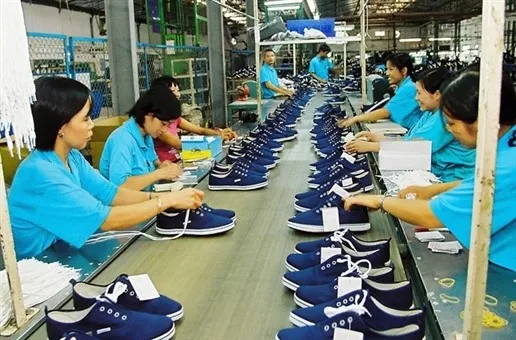VN footwear firms need to step forward: experts


|
| Foreign invested firms account for a massive 81 per cent of the nation’s leather and footwear exports. — Photo baodautu.vn |
HÀ NỘI — Domestic firms in the leather and footwear industry lag far behind their foreign directed investment (FDI) peers as Việt Nam cements its position as a leading world exporter in the sector, experts say.
Việt Nam’s leather and footwear industry posted exports of US$8.5 billion by July 15, a year-on-year increase of 10 per cent, the General Department of Việt Nam Customs has reported.
This figure makes Việt Nam fourth largest footwear producer in the world in terms of volume, after China, India and Brazil, and the third largest exporter in terms of value after China and Italy.
However, foreign invested firms account for 81 per cent of the export value and domestic firms account for the remaining, according to the Việt Nam Leather, Footwear and Handbag Association (Lefaso).
Lefaso attributes the domination of FDI firms to their ability to expand capacity and build new factories as they prepare to benefit from tax breaks accorded by several Free Trade Agreements (FTA) that Việt Nam has signed.
The association says domestic firms are constrained by capital shortage and market access, making it difficult for them to expand production and increase their competitiveness. On the other hand, FDI firms are able to build on already existing advantages of capital, experience, technological superiority and other factors.
A Thursday report in the online baohaiquan.vn (Customs News) cited experts as saying Vietnamese footwear enterprises have the opportunity to get new orders because China continues cutting investment incentives for textiles and footwear sectors to focus on hi-tech sectors.
However, with the situation tilted strongly towards FDI enterprises, domestic firms must bring in drastic changes to improve their position by strengthening information linkages, joining associations as well as promotion initiatives of ministries and other agencies.
Lefaso General Secretary Phan Thị Thanh Xuân said the staff of domestic enterprise should be trained to be proactive in marketing and accessing information and to respond quickly to orders, instead of passively waiting for customers to find them.
Moreover, increasing investment by FDI enterprises should be seen as an opportunity for domestic firms to learn from the former’s experiences. Domestic firms should also consider co-operating with FDI firms to get orders, Xuân said.
The report on baohaiquan.vn also said that domestic enterprises want the Government to support them through the creation of legal corridors, mechanisms and policies to facilitate their operations.
For instance, they need preferential policies on credit, taxes and labour so that they can reduce operational costs and become more competitive, the report said. — VNS
Tags:





